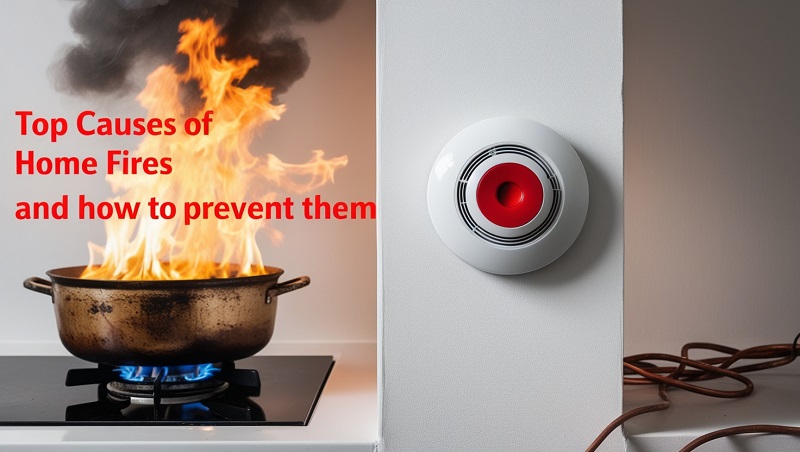Fires in homes are among the most common and devastating emergencies, often resulting in loss of life, property damage, and emotional trauma. Understanding the leading causes of residential fires is crucial to taking proactive steps to prevent them. This article, homesafetools.com examines the primary causes of home fires, offers insights into how they occur, and provides actionable prevention tips to keep your family and property safe.
Top 8 Causes of Home Fires
1. Cooking Fires (The Leading Cause)
How It Happens:
- Unattended cooking is the number one cause of home fires. Grease and oil overheating on stovetops or in ovens can quickly ignite.
- Using high heat without proper monitoring or distractions while cooking (e.g., leaving the kitchen to attend to other tasks) significantly increases fire risks.
Prevention Tips:
- Never leave cooking unattended. Stay in the kitchen when frying, grilling, or broiling.
- Keep flammable items like paper towels, dishcloths, and packaging materials away from heat sources.
- Use a timer as a reminder when cooking for extended periods.
- Install a fire extinguisher in the kitchen and learn how to use it effectively.
2. Heating Equipment
How It Happens:
- Improper use of space heaters and fireplaces can lead to accidental fires.
- Placing heaters too close to flammable items such as curtains, bedding, or furniture is a common mistake.
- Failing to clean chimneys can result in creosote buildup, which is highly flammable.
Prevention Tips:
- Keep space heaters at least three feet away from anything flammable.
- Turn off heaters when leaving the room or going to sleep.
- Use fireplaces with protective screens to prevent sparks from escaping.
- Have chimneys inspected and cleaned annually.

3. Electrical Fires
How It Happens:
- Faulty wiring, overloaded outlets, and the use of damaged electrical cords are major contributors.
- Plugging too many devices into a single outlet or using extension cords improperly can lead to overheating.
- DIY electrical repairs done without proper knowledge can increase the risk of electrical fires.
Prevention Tips:
- Hire licensed electricians to inspect and maintain your home’s electrical systems.
- Avoid overloading outlets and power strips. Use surge protectors when necessary.
- Replace frayed or damaged cords immediately.
- Install arc-fault circuit interrupters (AFCIs) to prevent electrical fires.
4. Smoking Materials
How It Happens:
- Cigarettes, cigars, and other smoking materials cause fires when improperly extinguished or discarded.
- Falling asleep while smoking indoors or disposing of ashes in unsafe containers can easily ignite nearby items.
Prevention Tips:
- Never smoke indoors, especially in bed or near flammable materials.
- Use deep, sturdy ashtrays and ensure cigarettes are fully extinguished before disposal.
- Keep smoking materials out of reach of children.
5. Candles
How It Happens:
- Leaving candles unattended or placing them near flammable items like curtains and furniture often leads to accidental fires.
- Knocked-over candles, especially in homes with pets or children, are also a frequent cause.
Prevention Tips:
- Never leave burning candles unattended. Always extinguish them before leaving the room or going to sleep.
- Use sturdy candleholders and place candles on flat, stable surfaces.
- Consider using flameless LED candles as a safer alternative.
6. Children Playing with Fire
How It Happens:
- Curious children playing with matches, lighters, or other ignition sources can inadvertently start fires.
- Fire play often occurs in hidden areas like bedrooms or closets, making early detection difficult.
Prevention Tips:
- Store matches and lighters out of children’s reach, preferably in locked cabinets.
- Teach children about the dangers of fire and the importance of fire safety.
- Supervise children closely and ensure they understand that fire is not a toy.
7. Flammable Liquids
How It Happens:
- Improper storage or use of flammable liquids such as gasoline, paint thinners, and cleaning agents can cause fires.
- Accidental spills near open flames or heat sources are particularly hazardous.
Prevention Tips:
- Store flammable liquids in tightly sealed, approved containers away from heat sources.
- Use these materials in well-ventilated areas and follow safety guidelines on their labels.
- Clean up spills immediately and safely dispose of flammable waste.
8. Appliance Fires
How It Happens:
- Malfunctioning appliances such as dryers, dishwashers, and refrigerators can overheat and catch fire.
- Lint buildup in dryer vents is a common cause of appliance fires.
Prevention Tips:
- Regularly clean lint traps in dryers and have vents inspected for clogs.
- Avoid running large appliances when you’re asleep or away from home.
- Replace faulty or old appliances with newer, energy-efficient models.
General Fire Prevention Tips
- Install Smoke Alarms: Place them on every level of your home and test them monthly.
- Develop an Escape Plan: Ensure everyone in your household knows how to evacuate safely in case of a fire.
- Keep Fire Extinguishers Accessible: Have extinguishers in high-risk areas like the kitchen and garage.
- Inspect Wiring and Heating Systems: Schedule annual maintenance with professionals.
- Practice Fire Safety Drills: Regular drills can save lives during emergencies.
The Role of Awareness and Education
Understanding the causes of home fires is only part of the solution. Education and awareness are critical in preventing these incidents. Communities, schools, and workplaces should regularly conduct fire safety workshops and drills to equip individuals with the knowledge and skills needed to act quickly in emergencies.
Conclusion
Most home fires are preventable with proper awareness, safety measures, and regular maintenance. By understanding the common causes of fires – such as cooking accidents, electrical malfunctions, and heating equipment misuse – you can take proactive steps to safeguard your home and loved ones. Fire prevention isn’t just a precaution; it’s a responsibility that ensures a safer living environment for everyone.
>>> Read more: Why Is Fire Safety Important?
